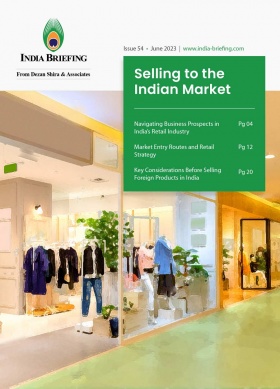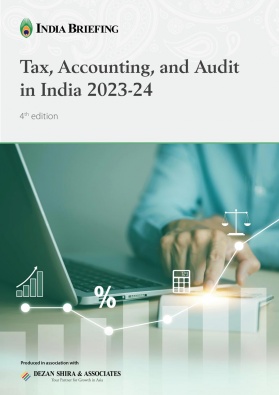Advance Authorization Scheme in India: Changes Made to Ease Compliance Burden on Exporters
India is simplifying its advance authorization scheme to expedite the process for exporters seeking duty-free imports of input materials that are used for final export goods. Exporters can access the sector-specific norms effortlessly and encounter lesser bureaucratic hurdles, which will facilitate faster processing.
In a bid to bolster the country’s exports and ease the process for exporters, the Indian government has recently introduced simplified norms for availing benefits under the advance authorization scheme. This scheme permits duty-free imports of input materials for exporters. The Directorate General of Foreign Trade (DGFT), which implements this scheme, has now taken steps to make the norm fixation process more efficient.
Under the advance authorization scheme, the eligibility of inputs is determined by sector-specific norms committees. These committees utilize input-output norms as the basis for evaluating the eligibility of inputs. By aligning with industry-specific requirements, the scheme ensures that exporters have access to the necessary inputs without unnecessary burdens or delays.
User-friendly norms database
To streamline the norm fixation process, the DGFT has created a user-friendly and searchable database of ad-hoc norms that were fixed in previous years. These norms can be used by any exporter without requiring a norms committee review, as outlined in the Foreign Trade Policy (FTP) 2023.
Exporters can now access this database on the DGFT website and search for specific norms based on three key criteria:
- Export or import item descriptions
- Technical characteristics
- Indian tariff classification codes
The ‘No-Norm Repeat’ approach as referenced above allows exporters to secure advance authorization without the requirement of committee revisitation, leading to expedited and streamlined processing. This trade facilitation innovation is anticipated to yield quicker processing times for exporters, enhance the business environment’s user-friendliness, and mitigate administrative complexities.
All you need to know about the advance authorization scheme
Advance authorization is a permit that allows businesses to import inputs duty-free, that will be used in the production of export goods, taking into account normal wastage.
Items eligible for duty-free import under this scheme include:
- Inputs that are physically integrated into the final exported product, accounting for regular wastage.
- Fuel, oil, and catalysts that are used during the production process to create the export item.
- Essential spare parts necessary for the exported product; these can constitute up to 10 percent of the CIF (cost, insurance, and freight) value of the authorization.
- Certain designated spices, that can be imported duty-free for specific activities, such as crushing, grinding, sterilization, and the production of oil or oleoresin. This privilege does not extend to activities like cleaning, grading, or repackaging.
They are not allowed to sell the products in the domestic market. The advance authorization is valid for 12 months from the date of issue.
Duty exemptions for imported inputs
The inputs imported are exempt from duties like Basic Customs Duty, Additional Customs Duty, Education Cess, Anti-dumping duty, Safeguard Duty, Integrated tax, and Compensation Cess, wherever applicable, subject to certain conditions.
Minimum value addition
Minimum value addition requirements apply to inputs exported under advance authorization, with a standard minimum of 15 percent. However, specific value addition criteria vary for different categories:
- Physical exports (when payments are not received in a freely convertible currency): They are subject value additions outlined in the Handbook of Procedures a document notified by the Ministry of Commerce and Industry. This handbook from the DGFT outlines the foreign trade procedures that must be adhered to.
- Tea imports: A minimum value addition of 50 percent is obligatory.
- Duty-free import of spices: Allowed solely for value-added processes like crushing, grinding, sterilization, or the production of oils and oleoresins. This allowance excludes uncomplicated tasks like cleaning, grading, repackaging, etc.
Export obligation
Recipients of advance authorization are obligated to fulfill an export obligation (EO), which involves achieving a certain value of exports within a designated timeframe. The EO requirement is outlined within the authorization document, and failure to meet it within the stipulated time can result in penalties. Upon successful fulfillment of the EO, it is essential to maintain documentation as evidence and furnish it when necessary. The prescribed period for compliance is typically 18 months from the issuance date of the advance authorization. However, this timeframe can differ for inputs related to various sectors, such as supplies for turnkey projects, defense, military, aerospace, etc.
How can exporters in India obtain advance authorization?
There are different ways to obtain an advance authorization:
- Standard Input Output Norms: Businesses can refer to the pre-notified Standard Input Output Norms for their specific sector to determine the eligible inputs for their resultant product.
- Self-declaration: Alternatively, businesses can make a self-declaration based on the procedure specified in the Handbook of Procedures, specifying the inputs required for their export product.
- Norms committee: In some cases, applicants may approach the norms committee for specific fixation of norms.
- Self-ratification scheme: Businesses can also use the self-ratification scheme prescribed in the FTP.
Eligibility for the advance authorization scheme
The eligible applicants for advance authorization are manufacturer exporters and merchant exporters tied to supporting manufacturers. However, for pharmaceutical products manufactured through non-infringing (NI) processes, the authorization is issued only to the manufacturer exporters.
Advance authorization can be issued for various purposes, including physical exports, supply to Special Economic Zones (SEZs), intermediate supply, and supply to specific categories mentioned in the FTP. It can also be used for supplying “stores” on board foreign-going vessels/aircraft, subject to the presence of specific Standard Input Output Norms for the items supplied.
It includes physical exports, intermediate supply, and supplies made to specified categories of deemed exports.
About Us
India Briefing is produced by Dezan Shira & Associates. The firm assists foreign investors throughout Asia from offices across the world, including in Delhi and Mumbai. Readers may write to india@dezshira.com for more support on doing business in India.
We also maintain offices or have alliance partners assisting foreign investors in Indonesia, Singapore, Vietnam, Philippines, Malaysia, Thailand, Italy, Germany, and the United States, in addition to practices in Bangladesh and Russia.
- Previous Article India Skill Report 2023: Findings on Talent Availability and Employability in Emerging Technologies
- Next Article India’s Chemical Industry Expected to Reach US$304 Billion by 2025








